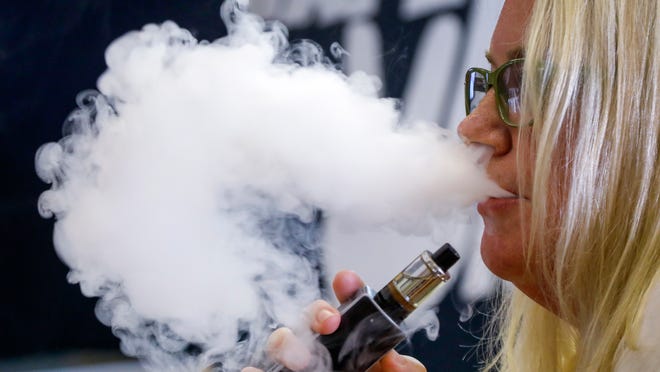WASHINGTON – The American Medical Association and the state of New York put vaping companies on notice Tuesday in the wake of President Donald Trump's apparent retreat from federal action against flavored electronic cigarettes.
More than two months after saying he would ban flavored vaping products other than menthol and tobacco and facing heavy opposition, Trump has not said what — if anything — he plans to do.
His administration says the rule-making process is "ongoing" but the ban expected by now is thought to be on hold while the administration considers next steps. The Washington Post and New York Times reported over the weekend Trump was convinced to back off from the plan because he could lose voters in 2020.
"In critical respects, he is getting bad political advice and bad public health advice," said Matthew Myers, president of the Campaign for Tobacco Free Kids. A flavor ban "won’t cost him votes, but backing down probably will because only 3.2% of Americans use e-cigarette products and a lot more parents are terrified about the effect on their kids, and they vote too."
'From Big Tobacco's playbook':New York sues Juul Labs, claims e-cigarette company marketed vaping products to teens
Meanwhile, the American Medical Association called for a total ban of all e-cigarette and vaping products on Tuesday.
“It’s simple – we must keep nicotine products out of the hands of young people," AMA President Dr. Patrice A. Harris said in a statement.
Also Tuesday, New York Attorney General Letitia James announced a lawsuit against Juul Labs, claiming the company illegally marketed flavored e-cigarettes to teenagers.

Congressional lawmakersare also addressing the issue, pushing for outright bans on vaping or limits on flavored products.
The House Energy and Commerce scheduled a markup for Tuesday on legislation that would ban flavors and online sales of all tobacco products, and also raise the age to purchase vape products to 21.
Myers, who is among those who still hope the administration will act, praised the legislative effort. He said it's "not beyond question" the bill could pass the House by the end of the year. While he said the Senate is harder to predict, "given the President’s initial support, it would be a mistake to say it has no support in the Senate."
Dangerous toxin:Nicotine vaping age to go up as CDC calls discovery of THC additive in lungs a 'breakthrough'
"The bill’s prohibition on flavored tobacco products, including flavored e-cigarettes and menthol cigarettes, is especially critical to stop tobacco companies from continuing to target and addict kids with enticing flavors," Myers said.
At the state level, Michigan and Massachusetts are among those that have temporarily banned flavored vaping products. The Massachusetts statehouse passed a permanent flavor ban last week and its senate may vote Wednesday. New York City may vote on a city-wide ban next week.
While those who favor vaping bans say Trump is bowing in the face of political pressure, administration officials said they are still working on the issue.
"President Trump and this Administration are committed to responsibly protecting the health of children," said White House spokesman Judd Deere. "At this time, we are in an ongoing rulemaking process, and I will not speculate on the final outcome."
Paul Blair, director of strategic initiatives with Americans for Tax Reform, said he provided the White House and Trump's campaign with data behind an editorial he wrote contending that "banning flavored e-cigarettes might cost Trump re-election."
Blair said Trump and his aides "weren't prepared for the political blow back" of a proposed ban, and are reassessing as the nation continues to grapple with an outbreak of vaping-related lung illnesses. First reported in the spring, the number of cases and deaths have climbed each week.
'Something has changed':People have been vaping for years but now they're dying. Could it be the devices?
As of Nov. 13, the Centers for Disease Control and Prevention reported 2,172 people injured and 42 dead. The CDC has linked to the injuries vitamin E acetate, used as a thickening agent or to dilute THC oil in vape cartridges to make it go further. Tetrahydrocannabinol, known as THC, is the ingredient in cannabis that creates the "high."
Most of the people with vaping illness also used nicotine-based electronic cigarettes. New federal numbers showing a big uptick in middle and high school vaping also has added new pressure for regulations.
In the past two months, the White House has been bombarded by vaping supporters who said a ban would be a mistake.
Greg Conley, president of the American Vaping Association, said Trump's lack of action is “at least a temporary victory."
On Sept. 11 at the White House, Trump said First Lady Melania Trump had pushed him to do something about children who vape.
"It's causing a lot of problems and we're going to have to do something about it," the president said after meeting with health policy advisers. "There have been deaths and there have been a lot of other problems."
Two months later, on Nov. 11, Trump acknowledged the delay by tweeting that he wanted to hold a meeting with interested parties.
"Will be meeting with representatives of the Vaping industry, together with medical professionals and individual state representatives, to come up with an acceptable solution to the Vaping and E-cigarette dilemma," Trump said. "Children’s health & safety, together with jobs, will be a focus!"
As of Tuesday, that meeting had not been scheduled.
Contributing: Kristin Lam, USA TODAY